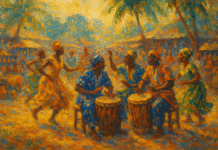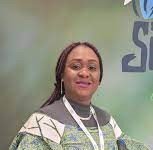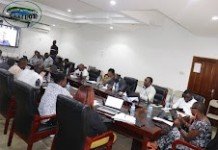By Francess Wright
Professor Matthew Christensen from the University of Texas in the United States disclosed at the launch of three plays on the Amistad Revolt at the Miatta Conference Center, Youyi Building in Freetown that the story of Sengbeh Pieh’s return to Sierra Leone was initiated by the Institute of African Studies at Fourah Bay College, University of Sierra Leone.
He made the statement while officially launching three plays on the Amistad Revolt co-written by three Sierra Leoneans-Mr. Charlie Haffner, Mr. Raymond De-Souza George and late Professor Ulisa Amadu Pat Maddy intimating that the book on the three plays would be available for sale and in libraries throughout the country asserting that the three authors have put the story of the Amistad Revolt on stage for all to see the heroic past of Sengbeh Pieh and others fighting against tyranny.
He informed that in his play, Professor Ulisa Amadu Pat Maddy looked into the future and sense of responsibility and that the three authors are now part of the global history of writers of the Amistad Revolt recalling that the enslaved were captured in 1839 reiterating that the three plays tell the same story but in different ways.
Professor Matthew Christensen went on to state that Sengbeh Pieh and other captives were captured and sold by their compatriots affirming that it is a story of resistance in a globalized world in addition to fighting for freedom and dignity.
According to the keynote speaker, one of the plays titled the ‘Broken Handcuff’ is a powerful reminder of independence and freedom and enlightened that Sengbeh Pieh and others fought for freedom during which they were recaptured and imprisoned in America after which some of them were sent home in West Africa but that unfortunately they did not meet their relatives whom they left behind as they too had been captured and sent into slavery.
Professor Matthew Christensen further articulated that publication of the plays by the Ohio University Press took a long time, that the press has published other books authored by Sierra Leoneans like Sly Cheney-Coker, that the play on Sengbeh Pieh has been performed over the past 30 years in America, Canada and other parts of the world and that the three generations of plays would last for thousands of years.
The Chairman of the ceremony, Professor Cecil M. Fyle observed that the event is to celebrate an artistic work of great artists and also bring to the fore Sengbeh Pieh who fought for freedom, that his heroism is told all over the world except Sierra Leone where little is known about him citing a huge library in the States devoted to him, that his story is also published in several journals in America and observed that Sengeh Pieh is a neglected hero.
According to Professor Cecil M. Fyle, there is need for Sierra Leone’s cultural values to be incorporated into the school curriculum
Earlier, Mr. Raymond De-Souza George, Special Adviser to the President on Cultural Affairs welcomed all to the ceremony to witness and contribute to making history asserting that Sierra Leone is rich in culture and storytelling that demands an audience adding that the event is about a man who fought for his identity through which he endured hardship but lamented that he is unknown to his people.
Other events lined up for the weeklong celebrations are a symposium at the conference hall of the Ministry of Tourism today, a play at the British Council Hall, Tower Hill in Freetown this Friday and an exhibition of the Amistad Revolt at the Sierra Leone Museum.
Highlights of the event were bidding for the book by the Director of Culture for Le250, 000 minimum, tributes to Professor Ulisa Amadu Pat Maddy by Mr. Raymond De-Souza George, statements by representatives of the Conference of Principals of Secondary Schools in the Western Area, Mr. Salami Carew of Tabulay Theatre and the Director of Culture in the Ministry of Tourism and Cultural Affairs, Mr. Foday Jalloh who assured that the Ministry would ensure that funds are allocated to cultural groups to facilitate their work.
In his vote of thanks, Mr. Charlie Haffner, Chairman of the Monuments and Relics Commission (MRC), underscored that artists in Sierra Leone are people of great minds but divided and appealed for unity, that the country has neglected a lot of heroes adding that the book is on the website and that they would receive royalties for the sale of the book for 30 years.




